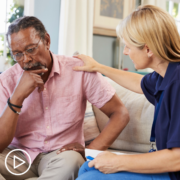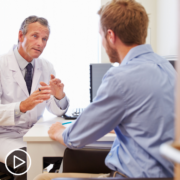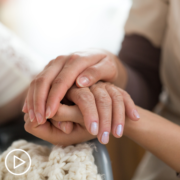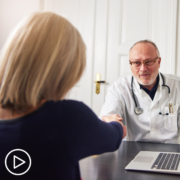How Does Us TOO International Support Prostate Cancer Patients and Their Loved Ones?
How Does Us TOO International Support Prostate Cancer Patients and Their Loved Ones? from Patient Empowerment Network on Vimeo.
What are the ways that Us TOO International can help prostate cancer patients and their loved ones? Jim Schraidt, a prostate cancer survivor and chairman of Us TOO’s board of directors shares how his involvement with support groups evolved after his diagnosis and how Us TOO is working to improve support for both patients and care partners.
Jim Schraidt is a prostate cancer survivor and Chairman of the Board of Directors for Us TOO International.
See more from The Pro-Active Prostate Cancer Patient Toolkit
Related Resources

How Could You Benefit from Joining a Prostate Cancer Support Group? |

Newly Diagnosed with Prostate Cancer? Consider These Key Steps |

|
Transcript:
Jim Schraidt:
My name is Jim Schraidt. I am now a 10-year, almost 11-year prostate cancer survivor. I was diagnosed in January of 2010 and had surgery in March of that year. Since then I’ve been involved in various support groups and some of those activities.
I found my way to a support group probably about three or four months after I was treated. And I was very active in that support group for a number of years. They helped me with a number of issues I was having at the time. And eventually I went on to become the facilitator of that group, and I’ve been in that role now for about five years.
Us TOO helped me find my initial support group. And we currently sponsor a network, a nationwide network of about 200 support groups. I became very interested in the work that Us TOO was doing, and I ran for Board, their Board of Directors. And I was elected, and I’m now finishing my sixth year on the Board and my second year as Chairman of that Board.
So, we’ve been very active in looking at the entire prostate cancer community and trying to develop new and better ways to serve patients. One of the things that we’ve accomplished in the last couple years is a partnership with a prostate cancer foundation, with is the leading private-research funder of prostate cancer research. So, we’ve worked with them to help make education about clinical trials available, for example. And they are contributing to our monthly newsletter with research news that’s actually put in laymen’s language so that people can understand it.
We’ve collaborated with other prostate cancer organizations, and we believe that this is critically important, that by working together we can amplify the patient voice and develop the best possible educational materials. So, in addition to the support groups, we have that going on. We also have a website that has a great deal of information about prostate cancer, support groups, and that sort of thing.
We are the prostate cancer sponsor for the Inspire site, which is an online community where prostate cancer patients can type in a question and have that question answered by other prostate cancer patients, or people who are knowledgeable in the field.
We actually have some practitioners that occasionally check in on that. So, then I think the final thing is that we have a couple of dial-in support groups that are for subspecialty types of patients and caregivers.
The first is called A Forum for Her, and it’s exclusively for women partners and caregivers. It gives them a separate and safe place to go and talk about the disease from a woman’s perspective. And then the second, newer dial-in support group we have is for gay men. And this is a group of men that for various reasons are less comfortable than they need to be in a broader kind of support group.
So, we’re working on that as well. One of our key initiatives as we look to celebrating our 30th year next year is support group leader education. And the goal here is to teach support group leaders best practices and make resources available to them so that they can either direct patients where to find information, or they can go back and find information and give that to patients directly.
So, the goal, once again, is to bring some standardization to the support group experience, and make sure that men are getting the best possible support and information.










